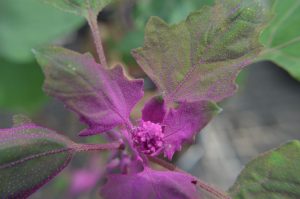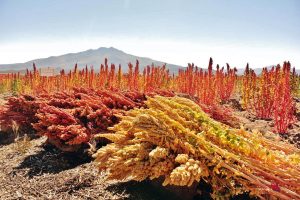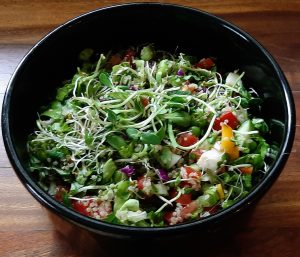
~ Quinoa ~
While most of us think of quinoa as a grain, it is actually a seed. Long labeled a pseudograin due to its familiar texture when cooked, quinoa (pronounced keen-wah) comes from a common garden plant, often pulled as a weed. With incredible versatility, quinoa is a relative to spinach. The leaves of chenopodium quinoa are as appealing as the seed. Best eaten when young as a tender baby green, quinoa leaves may be enjoyed in much the same way as spinach. The seed itself is completely free of gluten making it appealing for those that are sensitive to gluten or who have a condition called celiac disease and is desirable for many who are interested in losing weight or looking for a tasty alternative to complex carbohydrates.
 The origin of quinoa dates back over 7000 years to the Andes where it was first known to be cultivated in crops and harvested for food. The Incans revered it as sacred, terming it the ‘mother grain.’ With an outstanding nutritional profile, quinoa is one of the few foods that contains all nine essential amino acids to comprise a complete protein. Because of this, quinoa has grown in popularity around the globe and is widely known as a super food, the queen of seeds. While crops are still grown primarily in South America, it grows in a number of climates. While it does not tolerate frost well or temperatures above 95 degrees, quinoa enjoys full sun and grows in a wide variety of soil types. Beautiful also as an ornamental, it boasts colorful flowers before it goes to seed. For tips on growing your own quinoa, click here.
The origin of quinoa dates back over 7000 years to the Andes where it was first known to be cultivated in crops and harvested for food. The Incans revered it as sacred, terming it the ‘mother grain.’ With an outstanding nutritional profile, quinoa is one of the few foods that contains all nine essential amino acids to comprise a complete protein. Because of this, quinoa has grown in popularity around the globe and is widely known as a super food, the queen of seeds. While crops are still grown primarily in South America, it grows in a number of climates. While it does not tolerate frost well or temperatures above 95 degrees, quinoa enjoys full sun and grows in a wide variety of soil types. Beautiful also as an ornamental, it boasts colorful flowers before it goes to seed. For tips on growing your own quinoa, click here.
With hundreds of varieties, quinoa may be white, red or black. While all are a good source of fiber and are high in nutrients, the latter two are especially rich in vitamin E. Generally, the darker the color the higher the antioxidant value. Black quinoa is particularly appealing. While it contains the lowest overall fat content, it has the highest concentration of omega 3 fats beneficial for brain health. With many nutritional benefits, quinoa may also improve metabolic health and reduce inflammation.
Because quinoa is a seed and not a grain, the seeds can be sprouted, preserving the integrity of its remarkable nutritional profile that is naturally compromised when cooking. Cooked food triggers an automatic immune response in the body and denatures all protein in both plants and animals, breaking the amino acid bonds. Once these chains are broken, the damage is irreversible. The higher the temperature, the more the oxidative damage and the more toxic by-products. Imagine what happens to a hair when it is burned; forever changed, nothing will restore it. The good news is that sprouting raw quinoa is easy and only requires a little patience for the process to unfold. When sprouted and consumed raw, not only are more antioxidants released but the entire protein is intact and 100% bio-available, supporting the immune system rather than burdening it. Sprouting releases important enzymes allowing for easier digestion and absorption of nutrients. To learn how to sprout your own quinoa, click here. If you prefer convenience, you can also purchase sprouted quinoa seeds from most health food stores. Sprouted quinoa is delicious to add to salads, sandwiches or as a topping for most any savory meal.
I enjoy quinoa mixed with any number of fresh chopped veggies. Whatever I have on hand, I often toss into the mix. My savory salads are much like my fruit salads; anything fresh, raw and organic goes.

Sources and Resources:
Graham, Douglas N. The 80-10-10 Diet: Balancing Your Healthy, Your Weight, and Your Life One Luscious Bite at a Time. FoodnSport Press. Decatur, GA, 2006.
Hayes, Bethany. Morning Chores: A Complete Guide on How to Plant, Grow, & Harvest Quiona www.morningchores.com/growing-quinoa/
Jones, Taylor. Healthline: Nutrition: “What Is Quinoa? One of the World’s Healthiest Foods” 18 February 2021 https://www.healthline.com/nutrition/what-is-quinoa#TOC_TITLE_HDR_4
Kuballa, Jillian and Gunner, Kris. Healthline: Nutrition: “8 Evidence Based Health Benefits of Quinoa” 5 January 2022 https://www.healthline.com/nutrition/8-health-benefits-quinoa

Disclaimer:
These statements have not been evaluated by the
U.S. Food and Drug Administration.
This content is for informative purposes only and
should not be replaced for the advice of a medical professional.
While adopting healthy dietary changes
coupled with exercise can work wonders for the body,
you are advised to consult a licensed physician
before starting any new regime,
especially if you have any medical condition.
Please call us at 808-987-6010 or fill out the form below to request an appointment.
Error: Contact form not found.
